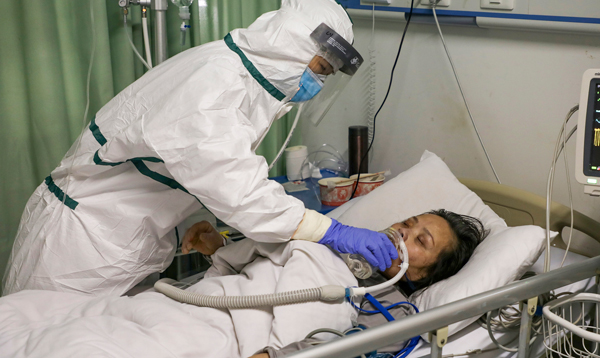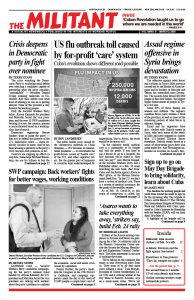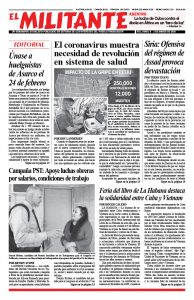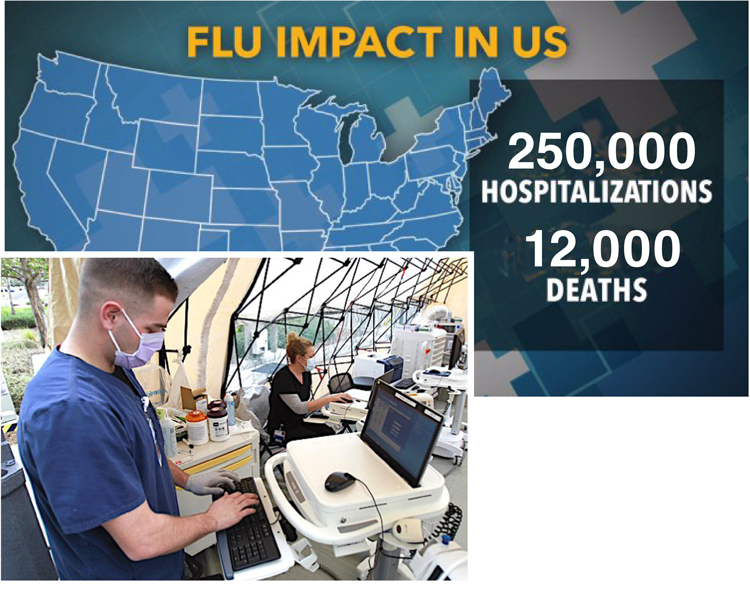The public health crisis caused by the coronavirus outbreak in China threatens — if it becomes an international pandemic — to overwhelm the profit-driven system of “health care” of the U.S. and other capitalist rulers. For the greater part of humanity in countries kept underdeveloped by imperialism, like in Africa, the result would be far worse still.
“In the capitalist world, medical care is a commodity to be bought and sold for profit. If you have to see a doctor or go to a hospital, the first question you’re asked is: How will you pay?” said Martín Koppel, of the Socialist Workers Party and a Pathfinder editor, at a Feb. 10 event launching the new book, Red Zone: Cuba and the Battle Against Ebola in West Africa, at the Havana International Book Fair. “In the U.S. we don’t have a system of medical care. There is a system of medical insurance, for the profit of the wealthy owners.”
As of Feb. 19, Covid-19, as this strain of coronavirus is called, has claimed over 2,000 lives, mostly in the province of Hubei. The number of those infected has soared past 70,000. And the disease has spread to dozens of countries, including Africa’s first reported case in Egypt.
There are currently 81,000 African students in China and up to 2 million Chinese living in Africa.
After a Jan. 31 World Health Organization alert, the U.S. government closed the border to anyone arriving from China, except U.S. citizens, everyone of whom will be quarantined for two weeks. Washington’s allies, from the rulers of Japan to Australia, have taken similar measures. The Chinese government complained, but imposed even more draconian measures, locking down some 70 million people, and enforcing some kind of quarantine for 700 million, almost half the country’s population.

While the new virus is front-page news, the fact is that every year tens of millions in the U.S. catch the common flu and tens of thousands die, mainly among the elderly and more vulnerable. The 2019-2020 flu season isn’t over, but the Centers for Disease Control and Prevention reports that over 12,000 people have died so far. They say 31 million people have caught the flu and over a quarter million were hospitalized.
They also report the flu vaccine put out this year wasn’t made to deal with the most common strain people have gotten.
Stores like Walgreens, CVS and Walmart post ads saying you can get the flu shot there for free. But in small print they clarify that’s only true if you have insurance. If not, the cost averages $40. Walmart is cheaper, only $39.88. And even if you do have insurance or Medicare, many will have a copay.
Left on their own to decide whether to get the shot — at whatever cost — only half of the people plan to get one, the National Foundation for Infectious Diseases reports.
This is all an indictment of the for-profit health care system. You’re left on your own, and then charged for it. Or you could pay with your life.
The highly contagious Covid-19 is up to 40 times as lethal as the flu, killing about one in 50. Already stretched thin by this year’s serious flu outbreak, hospitals would be thrown into severe crisis by any new surge, with shortages of facilities, medical staff, protective gear and medicines.
Chinese medics on the front line
The epidemic is spreading fast inside hospitals in China’s quarantine zone, infecting patients who went in with other maladies as well as health workers. Over 1,700 medical workers, mainly in Hubei province, have contracted the disease, with seven dying. The first was Dr. Li Wenliang, who was detained, slandered and silenced by authorities after trying to sound the alarm.
There was broad public anger and resentment at the government after Li died, and calls for freedom of speech broke the country’s online censorship.
Dr. Zhang Hong, of Wuhan University’s Zhongnan Hospital, wrote in the Lancet medical journal that supplies of protective equipment across the hospital system are severely deficient, and made worse by traffic controls in sealed-off cities. Hospitals have been forced to turn patients away, increasing the death rate.
Chinese President Xi Jinping admitted Feb. 15 that his government was responsible for “shortcomings and deficiencies,” and warned that stepped-up law enforcement and “societal control” was needed. A Chinese court issued a warning the same day that anyone hiding virus-related symptoms was in danger of a lengthy jail term, even the death penalty.
Increasingly concerned about the effects of the disease on profits, the State Council is now urging the “resumption” of production. Xi instructed subordinates to avoid any “overreactions” to control the epidemic and to avoid mass layoffs.
Cranking up the factories is the order of the day, say both the Chinese government and foreign bosses attracted to China’s lower wages, like General Motors, Caterpillar and iPhone producer Foxconn. But they’re all hindered by many workers remaining under quarantine.
The prolonged shutdown in China has sent economic shivers among profit-thirsty bosses around the world.
Cuba’s revolutionary example
In contrast to the capitalist world, Cuba has prioritized health care for six decades since workers and farmers made a revolution there in 1959.
Red Zone: Cuba and the Battle Against Ebola in West Africa, is a graphic description of Cuba’s internationalism, detailing the way volunteer Cuban doctors and nurses led in defeating the Ebola virus in West Africa in 2014-15. Donning protective gear, they would enter the highly infectious area of suffering patients — the “red zone” — to treat the human beings afflicted.
Cuba’s system of primary health care and medical treatment, at no cost to individuals and their families, is a conquest of the revolution that Cuban people justly take pride in. The opposite of a costly commodity, it starts from saving lives; from the right to health care for everyone, not “health insurance” for those who can afford it; and from basic human solidarity at home and abroad.
To paraphrase Cuban revolutionary leader Che Guevara, to revolutionize health care, you must first make a revolution.


